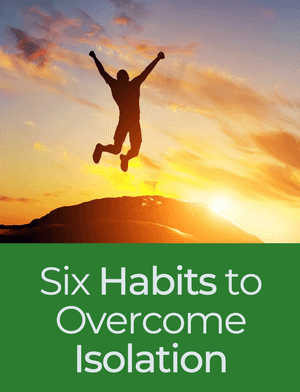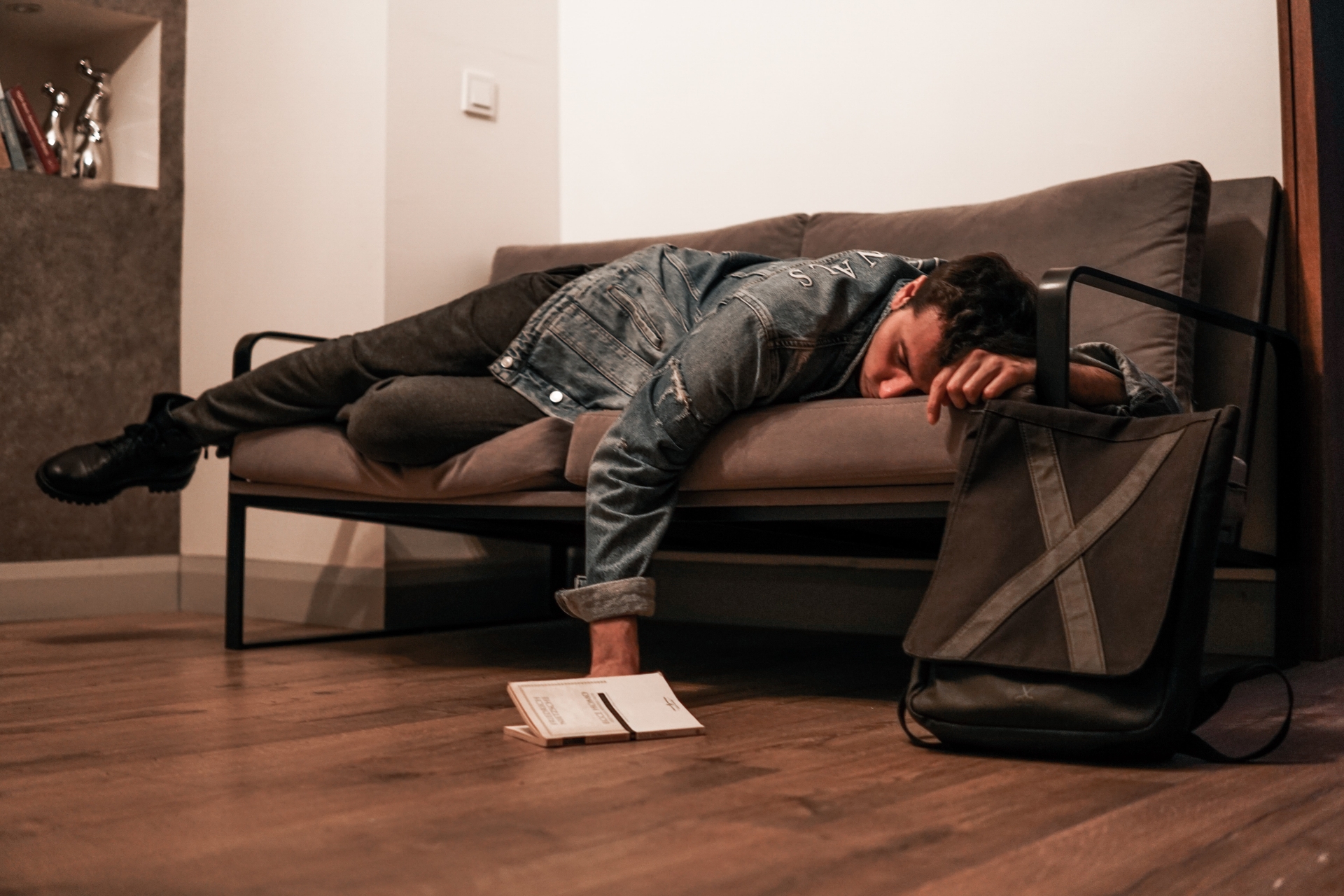
Get the Six Habits for Overcoming Isolation Guide for free
We all have the inherent intuition that sleep is essential to our well-being, but many of us are forced to push back our bedtime due to our busy modern lives. Neglecting sleep may appear to pay off in the short term, but a sleep deficit will severely impact every area of your mental and physical health in the long term.
Sleeping properly helps fight inflammation, reduces cognitive and physical disease, and makes it easier to maintain a healthy weight. Given that one in three Americans sleeps fewer than six hours a night and an estimated 20% of vehicle crashes are linked to drowsy driving, we may want to start paying more attention to the vital activity of sleeping1.
Listen to the podcast version here
A lack of sleep has cost me dearly in the past. When I worked on-site for Nasdaq a few years ago, I was obsessed with proving my worth. I neglected virtually every area of my life in order to focus exclusively on becoming a better software developer.
The imposter syndrome I experienced led me to believe I didn't deserve the job I had been given and that sooner or later, I would be found out and dismissed. I was stuck in a cycle of anxiety, fear, and massive feelings of inadequacy.
I had always been a good sleeper; as a child, I could literally slumber through the deafening noise of a jackhammer down the street. But this time was different; it didn't take long before my sleep began to suffer severely.
I started waking up at random hours of the night, unable to go back to sleep. I tried everything, including decreasing my water intake late at night and modifying my diet. Unfortunately, things only got worse from there, I would frequently only sleep four to six hours a night, and I also started having trouble falling asleep.
The lack of sleep manifested itself in many detrimental ways. I was extremely irritable and became even more defensive than I typically am. My relationships with family, friends, coworkers, and partners all suffered. I got into arguments with neighbors and did or said things to people I cared for that I can never take back.
After a year or two, I had enough; I stopped denying the problem and accepted sleep as one of my most important responsibilities. Nowadays, getting the right amount and quality of sleep is utterly non-negotiable, and I have learned some tips and tricks along the way that can help you too.
Restful sleep helps anyone feel refreshed and ready to take on the day ahead, but for those who suffer from depression or anxiety, restful sleep has an even more significant impact.
Eight out of ten people who struggle with depression have insomnia, and the struggle to sleep only worsens as we age.
Anxiety disorders, which affect one out of every five Americans4, can also increase the difficulty of sleeping. The symptoms of anxiety, both physical and mental, may cause sleep deprivation and create a vicious cycle that only worsens sleep deprivation.
A lack of sleep reduces your body's ability to fight off viruses and infections and increases your susceptibility to conditions such as diabetes, obesity, and high blood pressure2. During times of exhaustion, your body produces more cortisol which is linked to heart attacks and heart disease.
Research shows that sleep deprivation can severely impact your body's inflammation levels; chronic inflammation is associated with an increased risk of cardiovascular disease, cancer, and Alzheimer's disease3.
Studies have found that adults who get fewer hours of sleep than their peers are more likely to be overweight or obese5. Many of us believe that we can "catch up" on sleep during the weekends, but research has shown that doing so has no counter-effects on the weight gain caused by sleep deprivation.
A lack of sleep directly affects the levels of the two main weight management hormones, ghrelin, and leptin, which are closely tied to hunger and weight. Ghrelin increases your appetite, and leptin signals your body you are satiated. When you're exhausted, leptin levels decrease, making it harder to stop eating even when you're satiated.
Sleep doesn't only impact weight loss; it is also the time during which your body repairs and builds new muscle tissue.
Research suggests that sleep helps learning and memory in two distinct ways. First, when you're sleep deprived, your ability to focus is reduced, and thus, you cannot learn as efficiently. Second, sleep has a major role in the consolidation of memory, which is an essential prerequisite to learning new information6.
Memory consolidation, the strengthening of the neural pathways that form our memories, occurs during sleep. The specific characteristics of varying brainwaves during different stages of sleep are associated with the creation of particular types of memory.
Being chronically exhausted to the point of fatigue means you are less likely to perform properly. Neurons do not fire optimally, your muscles are not well rested, and the body's organs are not properly synchronized.
Install blackout curtains. Having any light sources in your bedroom can disrupt your sleep patterns and, thus, quality of sleep. Due to the invention of artificial light, we can now create a 24-hour day with constant exposure to sunlight, but we evolved to live in sync with the light and dark phases that set our circadian clocks.
Exercise properly. Your body releases copious amounts of growth-inducing hormones during sleep and stimulates the processes that build more muscular tissue. Research has shown that working out in the morning is most beneficial when it comes to sleep.
Lose unhealthy weight. The state of being overweight causes significant stress to your organs and nervous system and disrupts the proper functioning of your endocrine system. Research has shown that overweight individuals secrete notably higher levels of stress hormones after consuming a meal when compared to healthy individuals.
Ban screens before bedtime. Electronic screens emit a sleep-killing blue spectrum of light that triggers your body to produce daytime hormones rather than nighttime hormones such as melatonin. Remove any screens from the bedroom and train your brain to only associate it with sleeping and having sex.
Sleep at the right temperature. Thermoregulation profoundly influences the sleep cycles of your body. When it's time to sleep, there is an automatic drop in your core body temperature to help initiate sleep. Studies have found that the optimal sleeping temperate is between 60° and 68°F.
Set a reasonable bedtime. Research has shown that we get the most beneficial hormone secretions and recovery by sleeping between 10 pm and 2 am. To get the highest quality of sleep possible, try to go to bed within a few hours after sunset.
Be mindful of what you eat. The food you consume has a dramatic effect on your quality of sleep. Food isn't just nutrients; it's information. The types of food you eat stimulate processes that determine what your body and sleep will look like. Avoid chemicals, processed foods, sugar, antibiotic use, and eating three hours before bed.
Monitor your caffeine intake. Caffeine is a potent nervous system stimulant, and consuming a caffeinated beverage even as much as six hours before bed can cause issues with your sleep. If you aim to go to bed by 10 pm, stop drinking caffeine around 4 pm.
Avoid alcohol. The consumption of alcohol severely disrupts REM sleep and disturbs the natural balance between the various sleep cycles.
Get more sunlight. Your sleep cycle, or circadian rhythm, is severely impacted by the amount of sunlight you're exposed to during the day. Morning light signals your hypothalamus to wake up and triggers your body to produce the proper levels of daytime hormones that regulate your biological clock.
Avoid sleeping in. The more your daily sleep schedules differ, the worse your circadian rhythm will be disturbed. If you truly need to "catch up" on sleep, go for a daytime nap of under 30 minutes rather than sleeping in to avoid disturbing your natural sleeping cycle.
Get the Six Habits for Overcoming Isolation Guide for free

